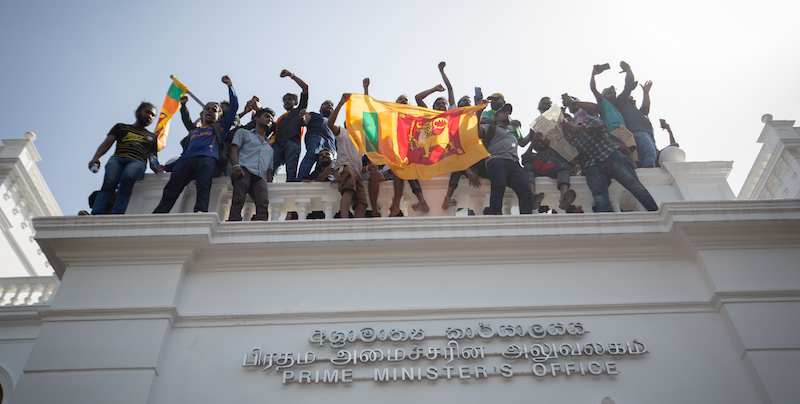Brussels · WhyMore than two years after the first proposal put forward by the Commission, the European Union was able to agree Tuesday night on one of its most controversial reforms: a new migration policy. It did so in a context in which the far right and its xenophobic rhetoric is gaining more and more strength. As negotiating sources admit, the far right “influenced” a new regulation that would tighten the bloc’s migration policies and aim to increase border controls and the return of migrants, and allow solidarity between member states upon request.
The final text approved by the European Parliament and member states, who spent all night negotiating, has not yet been announced. But diplomatic sources indicate that they have agreed to create a new registry and monitor migrants arriving at the border in order to “efficiently” and “quickly” return all those who are expected from the beginning to return. Inability to claim asylum protection. This method aims to “accelerate” the asylum application procedures and “have good control over the migrants from the time of their arrival until the case is resolved, either by acceptance or return.”
Border detention
In theory, the main goal is to enhance security and ensure that everyone who arrives “does not pose a threat.” However, as Blanca Garcés, senior researcher at CIDOP, points out, reducing the conditions for these processes and extending the detention period at the border to keep new arrivals under control could “contradict European and international legislation” because it “reduces legal guarantees and access to asylum.”
In this sense, the European Parliament pressed until the last minute to ensure that there was no racial discrimination in this new migrant registry at the border, which it had rejected from the beginning. In addition, the European Parliament wanted to exempt unaccompanied minors and families with children from fast-track procedures and subject them to the same type of processing as up until now. It is not yet known exactly how these two sides transformed.
On the other hand, the door is open to making exceptions in crisis situations such as those witnessed by the war in Syria or the Russian invasion of Ukraine. For example, deadlines for processing asylum applications may be extended, some community rules on immigration may be abolished or made more flexible in due course, and additional solidarity initiatives may be taken forward.
Solidarity is on the list
Among the goals of the new Migration Charter, which is a legislative package consisting of nine measures, is to improve and accelerate the movement of migrants between member states. In this sense, when deciding which country a newcomer will head to, special attention will be paid to the place to which he has family ties. To date, many Member States have refused to accept migrants for this reason, but in practice, this has usually meant that the person concerned has moved to the country in which he or she has relatives, thus encouraging legal “uncontrolled and illegal” internal movements.
The fact that the new legal text insists on family ties is expected to mean that a significant portion of migrants will not remain in the country from which they enter the EU, which is usually mainly Italy, Spain and Greece, but will be distributed throughout the world. Community block. However, beyond this factor, it will not be obligatory for any member state to cooperate in receiving migrants, as requested by the European Parliament and, among others, the head of the Spanish government, Pedro Sánchez.
In fact, members of the European Parliament surrendered to the insistence of member states on this issue and accepted an a la carte menu. The European Union’s goal is to redistribute at least 30,000 people annually among the twenty-seven in a proportional manner. In return, countries that do not wish to contribute will be able to choose whether to pay around 20,000 euros for each person they refuse to host or provide some type of assistance to countries receiving more migration pressure.
Agreements with third countries
The list also wants to strengthen agreements with third countries in order to slow down the waves of migration towards Europe. However, the same negotiating sources admit that the effects of the regulation are “limited” and that the “most determining” factor will be the “political action” of the European Commission and Member States when reaching agreements with non-EU countries.
However, the fact that countries outside the European bloc are involved in migration management also poses a risk to the EU. These third countries, which are largely ruled by authoritarian regimes that do not respect the human rights of migrants, often exploit waves of migrants and threaten to allow them to pass to the Old Continent in exchange for economic or political favors, as happened with Libya or, among others, Tunisia.
The European Union has prioritized the need to provide an image of consensus and control over migration before the European elections and in the context of the growth of the far right, and has finally concluded an agreement with many shortcomings and contradictions.
It has also raised a lot of dust in the past, for example, when millions of European Union countries rained down on Turkey, led by autocrat Recep Tayyip Erdogan, to retain refugees; Or the Spanish government’s decision to recognize Morocco’s sovereignty over Western Sahara, which previously caused a migration crisis. “It costs a lot politically to defend these agreements,” says migration expert Blanca Garcés, “it’s the risk you take if you put yourself in the hands of these countries.”
In this regard, the European Chamber has also set a red line to prevent non-profit organizations, such as Open Arms, from being considered a mafia of human traffickers or part of the political exploitation and threat that some authoritarian regimes are doing with immigration to make it stricter. he won. In fact, this is the accusation made by far-right governments such as those of Matteo Salvini or Giorgia Meloni of this type of entity.
Overall, negotiating sources accept that it is not a “perfect” reform and will not be a “panacea” for the migration challenge facing the EU, but they celebrate that at least the agreement has been closed and that it “improves the management” of migrants arriving in the bloc. A diplomatic source warns: “ “There is no need to create false expectations or simplify solutions, which would give wings to the far right.”
We must remember that since the European Commission introduced the long-awaited immigration reform, which has already been discussed since the 2015 refugee crisis, the far right has not stopped improving results, gaining influence and governments, as is the case in Italy, Finland, Sweden or the Netherlands, where It is increasingly possible that xenophobe Geert Wilders will take over the leadership of the executive branch. In addition, they have been able to influence the discourses and policies of centre-left and centre-left governments, such as in France and Germany, the two superpowers in Europe.
In this sense, Garcés criticizes that the European Union overcame “the need to give an image of consensus and control of migration before the European elections and in the context of the growth of the far right, and finally closed an agreement with many shortcomings and shortcomings.” “Contradictions.”

“Freelance social media evangelist. Organizer. Certified student. Music maven.”



